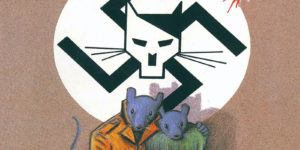The most-told joke about Auschwitz surfaces in different forms. As I first heard it while a teenager in “north London” — not just a cluster of adjacent postcodes, of course, but shorthand for a mindset that one kind of pundit loves to hate — two victims chuckle in heaven over the idiocy of an especially crass camp guard. The Almighty Himself overhears them and takes offence: “How can you laugh about such a hideous place?” “Well”, one of the murdered Jews replies to the bemused Lord, “I suppose you had to be there.”
The living numbers of those who were there diminish by the year. The New York-based Conference on Jewish Material Claims against Germany last week reported that the global total of Holocaust survivors now amounts to 245,000 souls, with a median age of 86. When the Third Reich fell, the vast majority were still small children; adult memory of the camps may soon disappear. At the same time, outright denial of the genocide of Jews or pseudo-scholarly scepticism gathers force. In December, one poll found that 20% of young Americans (18-29) agreed that the Holocaust was a myth, and fully 30% more neither agreed nor disagreed with such a claim.
So esoteric debates over the adequacy of Holocaust stories might benefit from an urgent reality-check. While critics parade their tender consciences over the missteps of this or that camp-themed novel or film, growing numbers believe that such fictions have little or no historical basis. This piece, like many others, hopefully (naively?) assumes a shared community of knowledge, and value. As, in different ways, do two recent works of Holocaust art: Jonathan Glazer’s new film The Zone of Interest, out in the UK this weekend, and its source material, Martin Amis’s decade-old novel of the same name.
Glazer’s German-language film is based only loosely on the book — it lacks any version of Amis’s three narrative voices for instance. Still, it shares with the original an urge to interrogate the ghastly parody of “ordinary” life created by and for the Nazi officials who oversaw the Auschwitz-Birkenau complex in occupied Silesia and the industrial plant — the Buna Werke — manned by slaves from the camp. Glazer works with silence, sound and image; Amis with torrential but evasive human speech. But each creator rests implicitly on a context of understanding that gives meaning to their efforts to show how human beings dodge or disguise their own most atrocious acts. What happens when that context crumbles?
Evidently, Glazer has thought hard about his audience’s limits. He has, pretty much entirely, eliminated the grotesque humour that animates two of Amis’s three voices. Queasily, guiltily, readers may laugh with Amis’s Angelus (“Golo”) Thomsen as this sardonic, dandyish liaison officer schemes to bed Hannah, the buxom wife of camp commandant Paul Doll. Scornfully, haughtily, we laugh at the dim, pompous Doll himself as he frets over the “great national programme of applied hygiene” he manages in a deluge of stilted clichés (Doll, like all deadly bores, prides himself on being blessed with a great “sense of humour”). Only the plain, bleak words spoken by the anguished Jewish Sonderkommando leader Szmul — saddest of all among “the saddest men in the history of the world” — retain a link between language and reality amid this empire of ashen lies.
Glazer, however, seems to have no residual faith in voice of any kind. In place of the Amis shtick and patter, a tar-dark comedy that requires the knowing laughter of active moral agents, he stages long, near-wordless shots of the death camp’s bucolic outskirts. These tableaux are punctuated by humdrum chit-chat as the commandant and his wife — here given their actual names, Rudolf and Hedwig Höss — go about their mundane business with hell itself just across the fence. Filming around Auschwitz itself, in the family’s reconstructed villa, Glazer took the crew off the set. He installed fixed miniature cameras to catch the deeds and (few) words of his remarkable lead actors, Sandra Hüller and Christian Friedel, and the bullied staff they laconically boss about.
Here, words do not simply fail; they atrophy almost completely. In their place, Johnnie Burn’s extraordinary sound design and Mica Levi’s ominous music take us into the charnel house we never see — save as puffs of smoke or drifts of ash. Ambient birdsong and summer breezes chirp or whisper in the background. Barked commands, stray gunshots and distant cries of pain and fear apprise us of the unseen world beyond the watchtowers. Industrial blasts, groans and roars erupt like the death-agonies of the stricken earth itself. Complete silence partners empty black, then blood-red, screens.
It’s a riveting transformation. A work by the most joyously, shamelessly wordy of post-war British authors has given rise to a meticulously chill essay in fatal silence and infernal noise. Indeed, only one of Amis’s unsettling gags has made an almost-intact transition from page to script. Asked at the theatre whether he enjoyed a play, Höss says that he couldn’t stop thinking about how to gas the audience in a space with such high ceilings. Otherwise, Glazer offers not so much an adaptation as an inversion. “I need something more than words,” laments Amis’s moral anchor Szmul as he endeavours to fathom “the near-farcical assiduity” of German hatred. The frozen pastoral of Glazer’s imagery, and the chthonic horror of his sound, supply that something with imagination and ingenuity.
Yet Amis took that “near-farcical” aspect of Nazi theory and practice seriously — which is to say, comically. And he was right to do so. Edgy, curdled, slightly off like aged game, the humour of his The Zone of Interest tumbles the reader between complicity and revulsion. You can see why Glazer might decide to leave the treacheries of voice and tone aside and seek other, visual and aural, means to convey the kitsch barbarity of this petty-bourgeois idyll. By and large, the movie eschews the savage irony that gives Amis his narrative momentum. It does have some jaw-dropping fragments of dialogue — as when Hedwig escorts her mother proudly around the “paradise garden” that abuts the camp walls or, alarmed by news of her husband’s transfer to HQ, protests that “you’ll have to drag me out of here”.
Those are plausibly Amis-like moments. For the most part, Glazer lets a soundtrack from the intestines of hell challenge the sun-dappled prettiness of the camera’s truth-defying gaze. Still worried about misreadings, he finishes with another dialogue-free sequence. In a documentary flash-forward, staff clean up in the preserved execution chambers of the actual Auschwitz museum, and scrub corridors lined with piteous vitrines of the victims’ shoes. Despite his notable artistry, he doesn’t quite trust every viewer to get the point. For Amis, in contrast, the language of fiction — a language torn between laughing and screaming — must do all the moral work.
I talked to him while he was completing The Zone of Interest, and asked about the inevitable charges of bad taste that duly landed at his door when the novel appeared. “I don’t deny myself bitter mockery as one of the weapons of excoriation,” he explained. “It was a ridiculous ideology, with huge irrationalities within it” — absurdities mocked by the secret dissident Thomsen, and upheld by the bombastic toady Doll. As that plodding fusspot wrestles with the nightmare bureaucracy of mass corpse disposal (blow the Stücke up and body-parts hang in the trees; burn them 24/7 and the air-protection chaps complain about after-dark glow), Amis refuses to lend the Nazi machine the dignity of sense and reason, however perverted. Dogged excess always opens a door to comedy. In print, The Zone of Interest opts for “excoriation” through the means of the reductio ad absurdum built into the Nazis’ boundary-free death cult. “It was almost comedic,” Amis said to me. “How far from logic as well as from any possible value it was. The comprehensiveness of the descent into the embrace of evil — you might almost call it Germanic rigour. Once there, let’s do it in the German way.”
“In for a penny…”, he pondered, citing Macbeth. “‘I am in blood / Stepped in so far, that, should I wade no more, / Returning were as tedious as go o’er.’ ‘Tedious’ is very good.” Thomsen, and behind him Amis, finds a sort of hideous hilarity in the sheer extremism of the genocidal-industrial complex. As he plots to seduce the heretically-minded Hannah, Thomsen tells her in a letter that future ages will consider the National Socialists “exotic and improbable as the prehistoric meat-eaters” — the unfeasibly gross T-Rexes of history. Much commentary on Glazer’s film has aligned its averted-eyes domesticity with Hannah Arendt’s familiar thesis about the “banality of evil”. Amis’s fiction, in contrast, does almost the opposite. In the fantastical floridity of its wickedness, his Auschwitz has — even the doltish Doll recognises this — “the decisive asset of being beyond belief”.
Amis’s humour, as ever, wields an ethical edge. Genocidal cruelty pursued via super-sized bureaucracy merits more than a platitudinous notion of everyday “banality” — and Arendt’s own thought about Adolf Eichmann took a subtler shape. In prose fiction, if not through the camera’s irony-free lens, only an epic absurdity might begin to approach this place where reason fails and all “whys” expire. (Amis’s afterword quotes Primo Levi, informed by an Auschwitz inmate shortly after his arrival that “Hier ist kein warum [Here there is no why].”)
Which is not to say that, as a novel, The Zone of Interest invariably hits its mark. Authorial insights — and stylistic tics — jarringly intrude on Doll’s ineffably dumb soliloquies (“There was I… offing old ladies and little boys”). Thomsen’s conspiratorial banter and badinage sit uncomfortably beside his wolfishly cynical collaboration with an evil he can see. The final chapters drop all grotesquerie to shift into downbeat post-war reflection: “The beginning of the German compromise with sanity. Social realism was now the genre.” They read like an anxious afterthought, in case the preceding antic scenes had felt too much like fun.
“Under National Socialism,” muses Thomsen after 1945, “you looked in the mirror and saw your soul.” Amis the novelist looked into that benighted glass and saw a defiantly incorrigible comedian who thought that scourging laughter not only could dare to breach the gates of hell, but should do so. To achieve that depends on a public able both to see the joke, and see beyond the joke. Perhaps, a decade ago, Amis was already mistaken in the underlying optimism that laid such a bet on a supportive context and community. Perhaps Glazer is correct to assume that parts at least of his audience would misjudge any irony and stumble over satire. Even on screen, however, The Zone of Interest takes it as read that we turn up because we know, and care. “You had to be there” — in spirit, in sympathy, in solidarity. But what of the ever-increasing millions who choose to stay away?
Disclaimer
Some of the posts we share are controversial and we do not necessarily agree with them in the whole extend. Sometimes we agree with the content or part of it but we do not agree with the narration or language. Nevertheless we find them somehow interesting, valuable and/or informative or we share them, because we strongly believe in freedom of speech, free press and journalism. We strongly encourage you to have a critical approach to all the content, do your own research and analysis to build your own opinion.
We would be glad to have your feedback.
Source: UnHerd Read the original article here: https://unherd.com/




